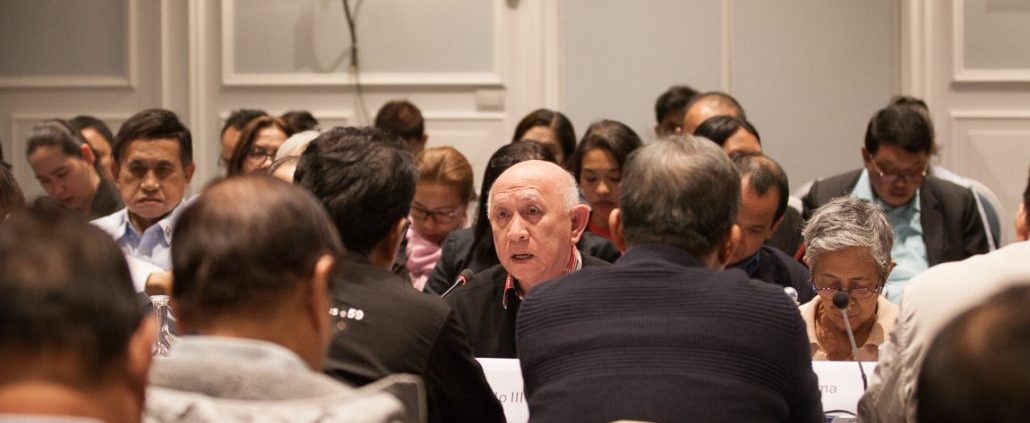Adherence to CARHRIHL first big test of GRP sincerity
The first major item of the agenda taken up by the GRP and NDFP panels in the third round of formal talks in the GRP-NDFP peace negotiations was the review of the implementation of CARHRIHL, the first major item in the substantive agenda in the GRP-NDFP peace negotiations. This agreement was approved and signed by the two panels in 1998.
The NDFP panel had previously insisted to place the review of the implementation of CARHRIHL as number one item on the agenda because the NDFP has been greatly disappointed by the failure of the GRP to fulfill many of its obligations under this agreement.
“The first big test of the seriousness of the GRP in these negotiations is compliance with CARHRIHL. For if the GRP cannot fulfill its obligations in an agreement already signed, what is our guarantee with regard to future agreements?” NDFP Panel Chairperson Fidel V. Agcaoili said.
The NDFP Negotiating Panel believes that the strict implementation of CARHRIHL is of prime importance for the peace process to move forward especially because it is the first major item in the substantive agenda in the peace negotiations. Mutual trust and confidence is essential if the peace negotiations are to succeed. Non-compliance is bound to erode mutual trust and confidence.
In his presentation, NDFP panel Chairperson Fidel V. Agcaoili, enumerated some of the most important violations by the GRP of CARHRIHL. He cited the retention of repressive Marcos decrees particularly those that are used against NDFP forces and against the basic masses.
Alleged NDFP personnel when arrested, are routinely slapped with non-bailable charges such as illegal possession of firearms and explosives to keep them perpetually detained. In most cases, the firearm is planted to serve as “evidence.”
Agcaoili also cited other decrees and repressive laws such as those restricting the right to peaceful assembly, authorizing the demolition of urban poor communities, and legalizing the CAFGU (Citizen’s Armed Forces Geographical Unit) whose members are often involved in carrying out atrocities in the countryside.
He also pointed to the violation by the GRP of the Hernandez political offense doctrine to which the GRP committed itself to uphold. Alleged NDFP forces are routinely charged with common crimes. For instance, a person alleged to be a New People’s Army (NPA) red fighter may be charged with multiple murder if he was suspected of being involved in an ambush resulting in the death of several GRP soldiers. Under the Hernandez doctrine the charge of multiple murder should be subsumed under the crime of rebellion.
The NDFP panel chairperson protested the continuing military operations against rural communities on the pretext of conducting so-called peace and development projects under OPLAN Bayanihan. They occupy schools, health and day care centers, barangay halls, public plazas, and even bus stops and private residences in more than 43 provinces and 146 municipalities all over the country. They impose food blockades and restrictions on the movement of residents, disrupting their economic activities.
Agcaoili formally raised with the GRP panel the case of three JASIG-protected NDFP consultants who remain in prison and prevented from participating in the ongoing peace negotiations. Eduardo Sarmiento, Emeterio Antalan and Leopoldo Caloza were arrested and convicted on trumped up criminal charges. To facilitate their release and enable them to participate in the ongoing GRP-NDFP peace negotiations, the GRP panel suggested that the consultants withdrew their appeals to pave the way for the granting of presidential pardon. As a result, their conviction became final. But until now they have not been pardoned and continue to languish in jail.
According to Agcaoili, “This constitutes not only a serious violation of CARHRIHL and JASIG but a betrayal of trust.”
During the session, Cristina Palabay, KARAPATAN Secretary General and NDFP-designated Independent Observer to the Joint Monitoring Committee, formally presented to the GRP panel documented cases of human rights violations committed by GRP forces and violations of CARHRIHL by the GRP.
As the talks were going on, the NDFP panel received a report about the cold blooded murder of Alexander Ceballos, a peasant leader of the National Federation of Sugar Workers (NFSW) by suspected members of RPA-ABB, a paramilitary unit under the payroll of the local government unit in the area. According to KARAPATAN this would be the first extra-judicial killing of a progressive peasant leader under OPLAN Kapayapaan the new counter-insurgency program that has replaced the notorious OPLAN Bayanihan. #
FIDEL V. AGCAOILI
Chairperson
NDFP Negotiating Panel
Reference:
Dan Borjal
email: [email protected]
twitter: https://twitter.com/dfborjal
facebook: https://www.facebook.com/
dborjal
viber: +31 643108419
whatsapp: Dan Borjal


